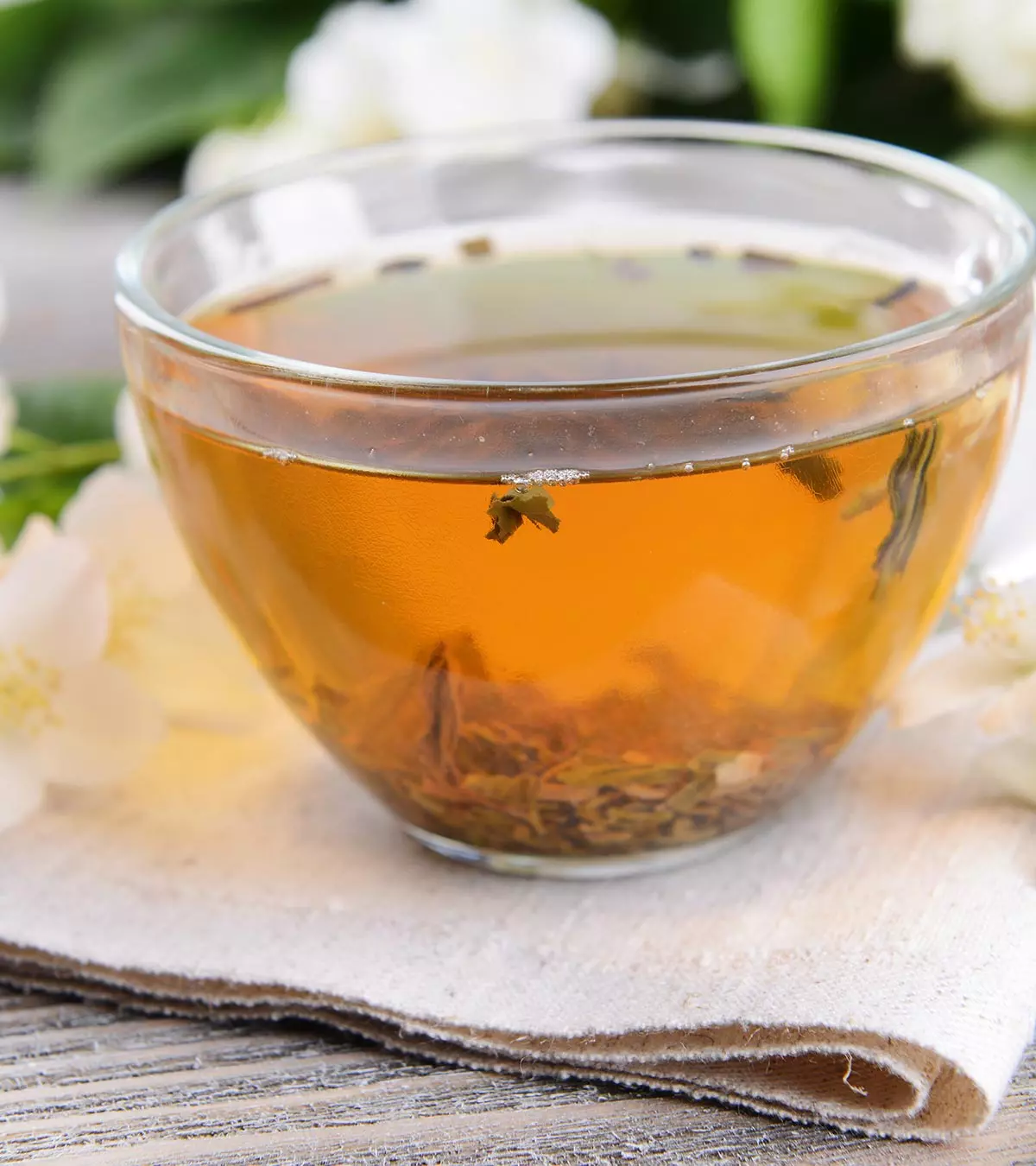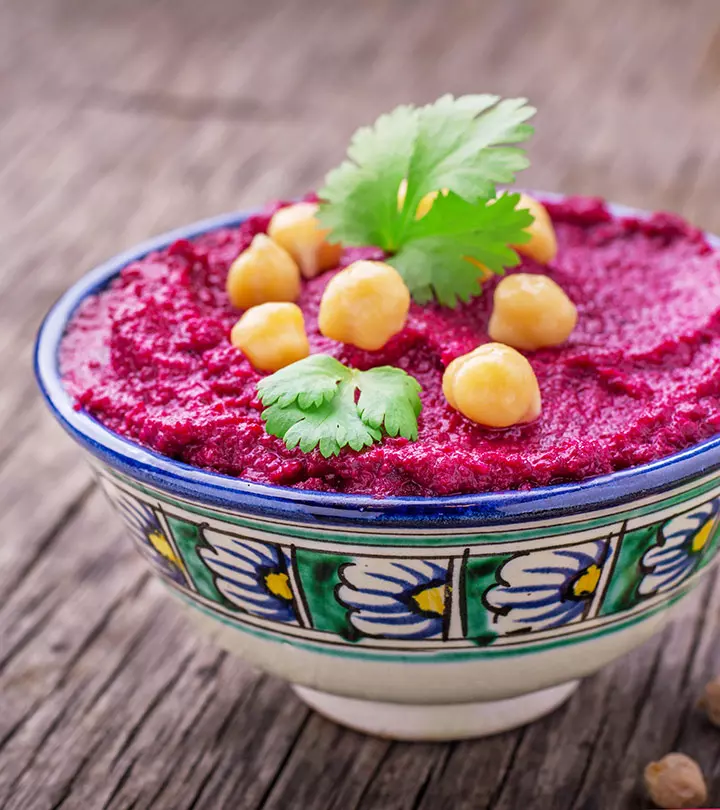
Image: ShutterStock
Many women ponder the safety of having amla during pregnancy. Amla or the Indian gooseberry is a fruit that looks like a lemon. It is green and tastes sweet and sour. Amla is rich in vitamin C and antioxidants and contains iron, phosphorus, and calcium. The number of nutrients in this fruit and its innumerable benefits make it an essential ingredient of Ayurvedic medicines. Consuming amla provides great health benefits to a pregnant woman by helping to purify her blood, relieve constipation, improve digestion, and others. However, you should make sure not to consume amla in excess, as it may lead to problems such as indigestion or constipation. So, read on to know more about the advantages of consuming amla during pregnancy and some interesting recipes.

Key Pointers
- Amla is rich in vitamin C and other essential nutrients like iron and calcium, necessary for a healthy pregnancy.
- It can relieve constipation, manage blood pressure, reduce morning sickness, improve digestion, and purify the blood.
- Amla is also known for its immunity-boosting qualities, ability to increase calcium levels, and reduce the risk of gestational diabetes.
- It is recommended to consume one fresh amla or one teaspoon of amla powder (4 grams) daily.
- Overconsumption of amla may lead to constipation, diarrhea, indigestion, and dehydration.
Is It Safe To Eat Amla In Pregnancy?
Yes, it is safe to eat amla during pregnancy as it is rich in micronutrients. Moreover, it is a blood purifier, power foodiFood that provides essential nutrition to the human body for overall well-being , and has no serious side effects (1). So, let’s delve a little deeper into the nutrition and benefits of amla.
Health Benefits Of Amla (Gooseberry) During Pregnancy
Amla can be taken in both raw and powdered form, according to Ayurveda. Here are a few ways gooseberry can support your overall health:
1. Eases constipation
Gastrointestinal disorders such as constipation and hemorrhoidsiSwollen veins in the anal and the rectal region causing pain and bleeding are quite common during pregnancy. The fiber in amla helps regulate bowel movements and other gastrointestinal problems (2).
2. Helps manage blood pressure
Vitamin C helps dilate blood vessels and keeps the blood pressure normal. Also, taking a glass of fresh amla juice every day might help avoid acidity and heartburn during pregnancy (3).
3. Reduces morning sickness
Morning sickness is one of the early pregnancy symptoms that troubles many to-be mothers. Amla’s energy-boosting and rejuvenating properties help overcome weakness when you are pregnant. It was also found to reduce tiredness (4) (5).
4. Purifies blood
Amla helps purify the blood. It helps remove the harmful effects of mercury and lead, and supports the constant supply of blood and oxygen to the developing fetus (6).
5. Helps maintain hemoglobin levels
Vitamin C aids iron absorption by the blood to maintain normal hemoglobin levels (7).
6. Improves digestion
Amla stimulates gastric juices and, thereby, helps in food digestion and absorption. Regular consumption of amla can, thus, reduce digestive issues such as gas formation and indigestion (8).
7. Enhances immunity
AntioxidantsiMolecules in the body that prevent cell damage caused by free radicals in amla boost the immune system and vitamin C helps combat infections such as common cold and urinary tract infection, which are common during pregnancy.
An added benefit is that it promotes lactation and breastfeeding post-delivery, thus promoting ample infant health by giving your infant nutritious breastmilk (9).
8. Source of calcium
Calcium content in this fruit contributes to fetal development, particularly teeth and bone development. During pregnancy, the calcium requirement doubles as the baby’s calcium needs are extracted from the mother’s bones. Therefore, regular consumption of amla offers sufficient calcium (10).
9. Helps manage edemaiA condition where excess fluid causes swelling in different body parts, including feet, ankles, face and hands
The anti-inflammatory nature of amla aids in reducing the swelling of hands and feet that is common during pregnancy(11)
.
10. Body detox
Amla has high water content. It increases your urine frequency and flushes away the toxins and radicals from the body (12).
11. Reduces the risk of gestational diabetes
Amla, with its anti-diabetic nature, can lower the chances of gestational diabetes (13).
13. Maintains lipid profile
Amla supports a good lipid profile during pregnancy(8)
.
 Quick tip
Quick tip While amla is packed with benefits, there could be a few things you must watch out for.
Are There Any Side Effects Of Amla During Pregnancy?
Amla has immense benefits for pregnant women according to traditional medicine, but over-consumption can cause constipation, diarrhea, indigestion, and dehydration.
Therefore, you should eat it in limited quantities.
Also, you should avoid it under the conditions mentioned below:
- In case you have a cold or cough as amla has a cooling effect on the body
- If you are suffering from diarrhea as amla has moderate laxative properties
- Watch out for the quantity of amla you eat so that you can get only the benefits of the magic food!
How Much Amla Can You Eat During Pregnancy?
One amla will help you meet the recommended daily allowance of 85mg of vitamin C during pregnancy because 100g of amla contains about 500mg to 1800mg of vitamin C. One serving of amla contains ten times more vitamin C than that present in one orange.
How Much Vitamin C Is Present In One Amla?
One amla will help you meet the recommended daily allowance of 85mg vitamin C during pregnancy because 100gm of amla contains about 500mg to 1800mg of vitamin C
. One serving of amla contains ten times more vitamin C than that present in one orange.
In the next section we would tell you how you could include amla in your diet.
How To Eat Indian Gooseberry (Amla) During Pregnancy?
Amla is among the best fruits to eat during pregnancy. Incorporating amla into your diet in the following ways can be a natural supplement for maternal health.
1. Amla murabba
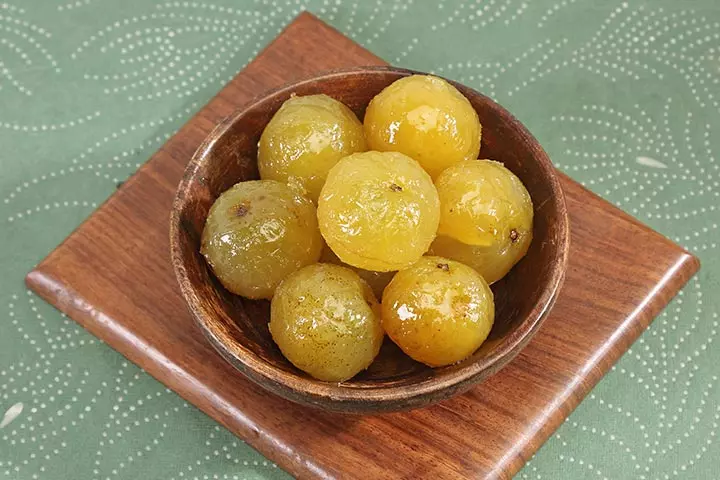
Amla cooked in sugar syrup, and flavored with cardamom could be a great alternative to sweet pickles.
You will need:
- 1kg amla
- 1 ½kg sugar
- 2tsp chemical lime
- 6 cups water
- 1tbsp lemon juice
- 1tsp cardamom seeds, crushed
How to:
- Wash amla thoroughly and perforate them using a fork.
- Dissolve lime in water and soak prickled amla overnight.
- In the morning, remove and wash them, and soak them in lime water.
- Drain the lime water and wash them thoroughly. Squeeze so as to eliminate the lime remains.
- Now boil water and drop the amlas into the boiling water.
- Cook them until they turn transparent and tender.
- Drain the water and keep the amlas aside.
- Now prepare a syrup using six cups of water, sugar, and lemon juice. Keep mixing until you see one-thread consistency.
- Add cooked amlas into the sugar syrup, bring it to a boil and simmer for four to five minutes.
- Allow it to cool and store in an airtight container.
- You may add cardamom powder or any other flavoring to it.
Preparation time:
1 hour 10 minutes
Benefits of amla murabba in pregnancy
- Taking amla murabba is called “the elixir of life” because it:
- Promotes good health
- Improves appetite
- Aids in digestion
- As a herbal medicine, it gives strength to both the mother and the fetus
- Supplies enough vitamin C to the mother and the fetus
Do not consume the ones available in the market as they contain chemical preservatives.
2. Amla candy
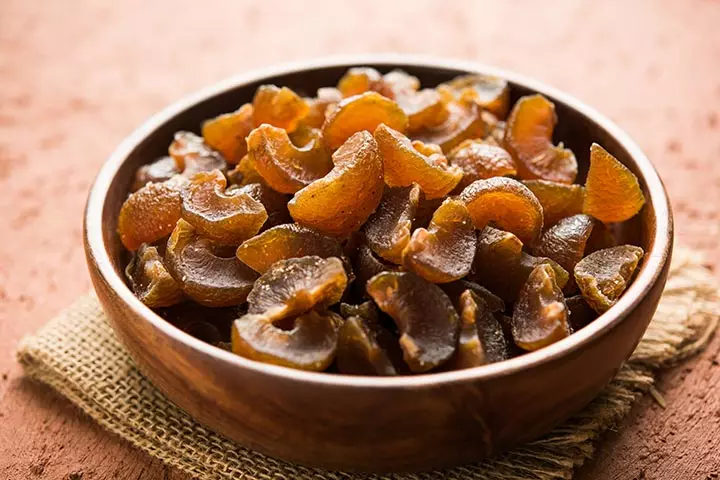
Made by boiling amla, you can store it for many days to enjoy the goodness it provides.
You will need:
- 250g amla
- 150g sugar
- 1 tsp cumin powder
- 1 tsp dried ginger powder
- 2 tbsp sugar powder
- A pinch of edible food color
How to:
- Wash the amlas and pat dry them using a clean paper napkin.
- Boil enough water, and then add amla.
- Boil for two more minutes and drain the water.
- Cut amla into slices.
- Add cumin powder and ginger powder to the sliced amla.
- Add sugar, close the container and leave it aside.
- On the following day, you will notice the slices floating in sugar water.
- On the third day, they will begin to settle down.
- Filter the mixture, and you can use the collected syrup as gooseberry sherbet.
- Keep the slices in sunlight for about two days.
- Prepare a mix of sugar powder and food color, and sprinkle it on the dried amla slices.
- Store them in an airtight container, and you can enjoy the candies whenever you feel like.
Preparation time:
5 days
Benefits of amla candy during pregnancy
Amla candy and amla murabba are similar. The candy is a mixture of amla and sugar whereas Amla murabba is made of amla dipped in sugar syrup. It is safe for pregnant women as it helps promote and restore prenatal health.
- Boosts immunity levels
- Provides naturally glowing and healthy skin
- Perfect cure for cold and cough
3. Amla juice
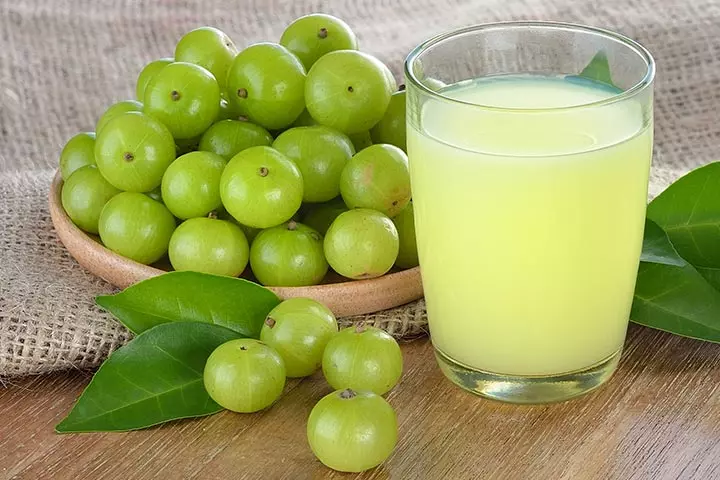
Made of fresh amla along with seasoning agents, it can be a very healthy addition to your diet.
You will need:
- 3 amla, cut into small pieces
- 1 ½ cup water
- 2 tbsp honey
- A pinch of crushed pepper
- A pinch of salt
How to:
- Blend chopped amla along with water.
- Filter the mixture to discard the pulp.
- Add honey, pepper powder, and a pinch of salt. Mix well.
- Amla juice is now ready to have. You can also mix it with buttermilk for an added taste.
Preparation time:
Five minutes
Benefits of amla juice during pregnancy
- It has a high cooling effect, and when mixed with honey, it offers body warming properties.
- It may be one of the natural remedies that help eliminate phlegm and toxins from the body.
- Relieves burning sensation.
 Quick tip
Quick tip4. Amla supari
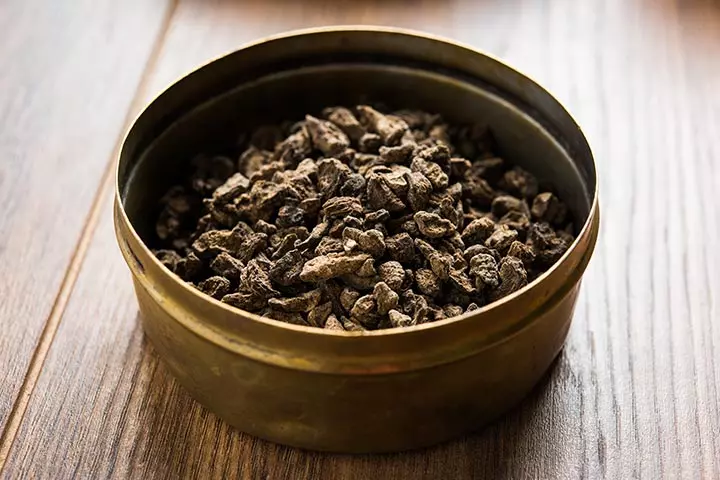
A delicious finger licking recipe that serves as a mouth freshener.
You will need:
- ½kg amla
- 2 to 3 tbsp carom seeds
- 2 to 3tbsp fennel seeds
- 2tbsp black salt
- 2tbsp rock salt
How to:
- Bring four to five cups of water to boil and add amla. Cook for 10 to 15 minutes more on a low to medium flame.
- Leave it for another ten minutes and drain the water. Let amla cool down completely.
- Deseed and chop them into small pieces.
- Dry roast carom seeds and fennel seeds together on a low flame. Cool the mixture and blend to form a powder.
- Add the above powder, black salt, and rock salt to the amla pieces and mix thoroughly.
- Leave this is sunlight for about four to five days.
- Once they become dry, transfer to an airtight container and store it.
Preparation time:
4 days
Benefits of amla supari during pregnancy
- Prevents nausea and vomiting
- Beats indigestion by releasing gastric juices
- Eases abdominal pain
- Relieves cold and flu infections
5. Amla powder
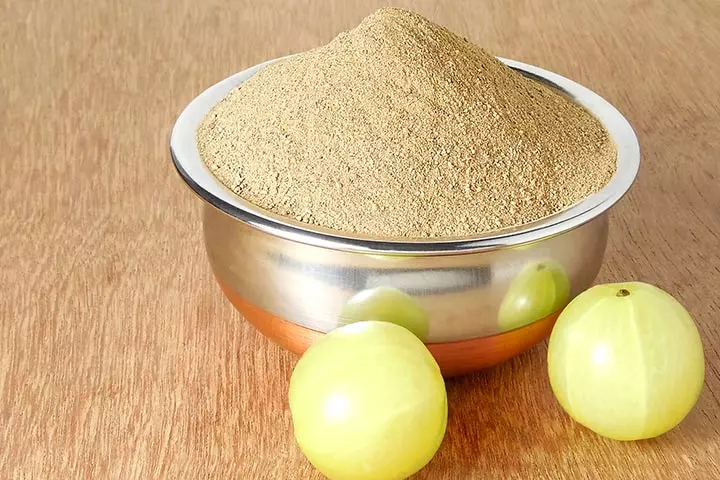
This is 100% pure byproduct of amla that is good for health, skin and hair.
How to:
- Wash amla thoroughly and pat them dry.
- Cut them into small pieces, or you can also grate them for easy grinding.
- Spread the pieces on a glass or steel plate, and dry them under sunlight.
- It might take a few days for them to dry based on the climatic conditions. You can cover the plate with a muslin cloth so as to protect from dust.
- Once the pieces are completely dry, blend them in a mixer for a fine powder.
Preparation time:
Depends on how quickly amla dries up
Benefits of amla powder during pregnancy
- Amla powder offers similar benefits as fresh amla.
- Has culinary uses
- Aids hair growth and prevents premature graying
- Slows down aging process
6. Pickled amla
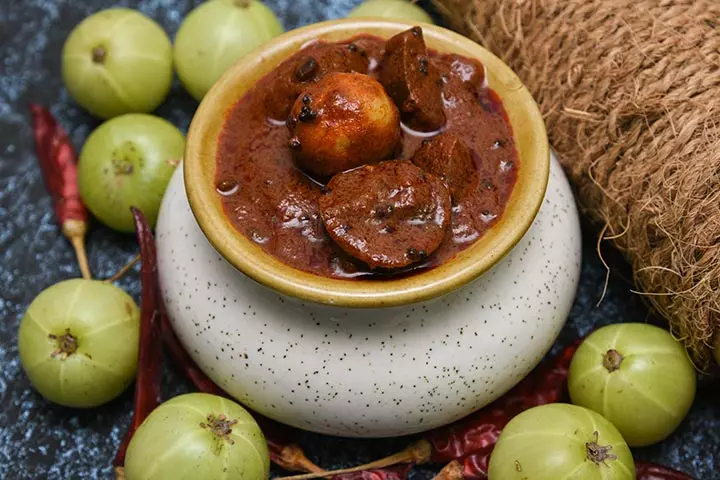
If nothing satiates your appetite other than a pickle, then this could be the best one to choose as it is filled with immense benefits.
You will need:
- 150gm amla
- 4tbsp oil
- 2tsp mustard
- 1 large lemon
- 3 to 4tsp red chili powder
- 1 or more tsp salt
- ¼tsp turmeric
- 1 large garlic clove, minced
- A pinch of methi seeds
How to:
- Wash amla thoroughly and pat dry with a clean cloth. Make some random incisions using a knife.
- Take mustard and methi seeds, blend them into a fine powder.
- Fry amla taking some oil until they turn light golden.
- Add garlic and turn off the flame. Leave it for some time.
- Add all other ingredients, except the lemon juice.
- Once the mixture cools, add lemon juice.
- Mix all of it thoroughly and check for the salt.
- Transfer to a glass container and let it rest for two to three days.
- Mix again using a dry spoon, and if needed, add some more lemon juice and salt.
- You can eat it with rice or paratha.
Preparation time:
15 minutes
Benefits of amla pickle during pregnancy
This fermented version of amla is beneficial in many ways.
- Reduces ulcers, protects liver from any damage and therefore offers immunity against diseases
- Boost body’s response to injuries.
Frequently Asked Questions
1. Is amla good for the uterus?
A case study reported that amla, when included in ayurvedic formulations, could play a substantial role in managing uterine fibroids (15).
2. Is amla good for vaginal health?
A few studies demonstrated that amla juice (Emblica Officinalis) might help in alleviating vaginal burning and vaginal discharge in case of infections (5) (16)
3. Does amla have estrogen?
According to Chicago-based, board-certified obstetrician/gynecologist Dr. Nicole E. Williams, “Amla does not contain estrogen. Instead, it appears to have anti-inflammatory and antioxidant properties. In Ayurvedic medicine, amla berry has been traditionally used as a women’s health tonic. It is believed to help balance estrogen levels, reduce stomach cramps, and support reproductive health.”
4. Are there any traditional practices or beliefs surrounding amla and pregnancy in different cultures?
Some traditional practices surrounding pregnancy and amla include using amla to cure pregnancy discomforts such as constipation and morning sickness. A blend of a teaspoon of amla powder mixed in a daily glass of milk is believed to manage morning sickness. At the same time, a concoction of each fruit of Harad and Behera and two amla fruits is considered a laxative that helps manage constipation (18). However, consult your OB/GYN before incorporating any remedy into your pregnancy routine to prevent complications.
5. What are some creative ways to include Amla in your diet?
Fresh or dried Amla can be easily added to many modern dishes while maintaining its nutritional value. Add it to green smoothies, or sprinkle dried Amla powder over yogurt. It can also be incorporated into chutneys or dips.
Consuming amla or Indian gooseberry during pregnancy is known to impart several benefits, including reducing morning sickness, improving digestion, and lowering the risk of gestational diabetes. However, having it in excess quantities might lead to dehydration and diarrhea. Therefore, ensure to consume one amla per day during your pregnancy to fulfill your vitamin C requirement. You can either make it into a murabba or have it in the form of juice. Either way, the benefits are almost the same.
Infographic: How To Make Healthy Amla Jam For Pregnant Women?
A little sour and sweet in taste, amla or Indian gooseberries are lemon-like fruits, popular for their use in herbal remedies. Amla is also advised to be consumed during pregnancy. So, check out the infographic below for a stepwise recipe of Amla jam to include in your diet to savor its taste and reap its benefits. Illustration: Momjunction Design Team
Illustration: Benefits Of Eating Amla (Indian Gooseberry) During Pregnancy
_during_pregnancy_illustration.jpg.webp)
Image: Dall·E/MomJunction Design Team
References
- K.H. Khan; (2009); Roles of Emblica officinalis in Medicine – A Review.
https://citeseerx.ist.psu.edu/viewdoc/download;jsessionid=6B76CB3DAE799626A9A87844F6C1AD19?doi=10.1.1.547.9201&rep=rep1&type=pdf - K.P. Sampath Kumar et al.; (2012); Recent Trends in Potential Traditional Indian Herbs Emblica officinalis and Its Medicinal Importance.
https://citeseerx.ist.psu.edu/viewdoc/download?doi=10.1.1.1008.1346&rep=rep1&type=pdf - Shreesh Ojha et al.; (2011); Protective effect of Emblica officinalis (amla) on isoproterenol-induced cardiotoxicity in rats.
https://citeseerx.ist.psu.edu/viewdoc/download?doi=10.1.1.962.4036&rep=rep1&type=pdf - Sushil Kumar Middha et al.; (2015); Toxicological Evaluation of Emblica officinalis Fruit Extract and its Anti-inflammatory and Free Radical Scavenging Properties.
https://pubmed.ncbi.nlm.nih.gov/26929577/ - Srivasuki K.P.; (2012); Nutritional And Health Care Benefits Of Amla.
https://bioinfopublication.org/files/articles/3_2_27_JP.pdf - Emblica.
https://www.utep.edu/herbal-safety/herbal-facts/herbal%20facts%20sheet/emblica.html - Tara Gopaldas; (2002); Iron-deficiency anemia in young working women can be reduced by increasing the consumption of cereal-based fermented foods or gooseberry juice at the workplace.
https://pubmed.ncbi.nlm.nih.gov/11975375/ - Biswas Gopa et al.; (2012); A comparative clinical study of hypolipidemic efficacy of Amla (Emblica officinalis) with 3-hydroxy-3-methylglutaryl-coenzyme-A reductase inhibitor simvastatin.
https://www.ncbi.nlm.nih.gov/pmc/articles/PMC3326920/ - Pranoti Belapurkar et al.; (2014); Immunomodulatory Effects of Triphala and its Individual Constituents: A Review.
https://www.ncbi.nlm.nih.gov/pmc/articles/PMC4293677/ - Sameer L Pradhan and Priya S Pradhan; (2011); Ayurvedic medicine and anaesthesia.
https://www.ncbi.nlm.nih.gov/pmc/articles/PMC3190505/ - Mahaveer Golechha et al.; (2014); Anti-Inflammatory Effect of Emblica officinalis in Rodent Models of Acute and Chronic Inflammation: Involvement of Possible Mechanisms.
https://www.ncbi.nlm.nih.gov/pmc/articles/PMC4158298/ - Amla: An Ancient Super Berry Emerges from India.
https://www.clinicaleducation.org/resources/reviews/amla-an-ancient-super-berry-emerges-from-india/ - Mai A Elobeid and Elham A Ahmed; (2015); Antidiabetic Efficacy of Aqueous Fruit Extract of Amla (Emblica officinalis Gaertn) in Streptozotocin-Induced Diabetes Mellitus in Male Rats.
https://www.tjpr.org/admin/12389900798187/2015_14_5_9.pdf - Food In Pregnancy: An Ayurvedic Overview.
https://www.ncbi.nlm.nih.gov/pmc/articles/PMC3336338/pdf/ASL-28-30.pdf - Kamini Dhiman; (2014); Ayurvedic intervention in the management of uterine fibroids: A Case series.
https://www.ncbi.nlm.nih.gov/pmc/articles/PMC4649577/#!po=25.0000 - Masuma Zaki; (2016); Efficacy of Amla (Emblica officinanis) and Shibe yamani (potash alum) in the management of Candida vaginitis: a randomized standard controlled trial.
https://www.ijrcog.org/index.php/ijrcog/article/view/1165 - Consuming Amla During Pregnancy? FAQ’s.
https://www.womenfitness.org/amla-pregnancy-questions/ - Neetu Sharma; (2006); Indigenous medication used by Himachali women to cure pregnancy discomforts.
https://nopr.niscpr.res.in/bitstream/123456789/2381/1/IJTK%207%284%29%20638-641.pdf
Community Experiences
Join the conversation and become a part of our nurturing community! Share your stories, experiences, and insights to connect with fellow parents.
Read full bio of Dr. Shikha Sharma
- Dr. Nicole Williams is the founder of The Gynecology Institute of Chicago and is a member of American Mensa, the international high-IQ society. She travels across the world advocating women’s health and has worked in Haiti, Guyana, Rwanda, Ghana, the Philippines, Mexico, and Cambodia. Dr. Williams did her MD at Loyola University Chicago Stritch School of Medicine and holds 15 years of experience in the field of medicine.
 Dr. Nicole Williams is the founder of The Gynecology Institute of Chicago and is a member of American Mensa, the international high-IQ society. She travels across the world advocating women’s health and has worked in Haiti, Guyana, Rwanda, Ghana, the Philippines, Mexico, and Cambodia. Dr. Williams did her MD at Loyola University Chicago Stritch School of Medicine and holds 15 years of experience in the field of medicine.
Dr. Nicole Williams is the founder of The Gynecology Institute of Chicago and is a member of American Mensa, the international high-IQ society. She travels across the world advocating women’s health and has worked in Haiti, Guyana, Rwanda, Ghana, the Philippines, Mexico, and Cambodia. Dr. Williams did her MD at Loyola University Chicago Stritch School of Medicine and holds 15 years of experience in the field of medicine.
Read full bio of Swati Patwal
Read full bio of Rebecca Malachi
Read full bio of Aneesha Amonz







